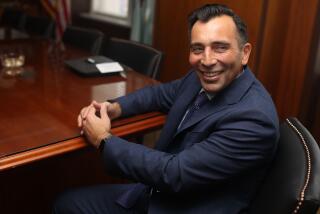Arthur Manella; Founder of Prominent Law Firm
- Share via
Arthur Manella, a distinguished tax lawyer and the co-founder of one of Los Angeles’ largest law firms, Irell & Manella, died Thursday of cancer at his home in Studio City.
During a long career as an attorney, Manella, who was 79, handled the tax problems of many important entertainment figures, including Lucille Ball, Desi Arnaz, Frank Sinatra, Dean Martin, Burt Lancaster, Elizabeth Taylor and Lou Costello, as well as the Columbia, and Paramount movie studios, Mattel and Teledyne.
Manella also helped launch the USC Tax Institute, which holds an annual scholarly conference on tax law issues.
“He represented a lot of celebrities in a very professional way, but he never got seduced by the glamour of it. He never let anyone make him their hanger-on,” said Jeanne Walker, who was Manella’s secretary for several years before she became Irell & Manella’s office manager.
Manella’s longtime partner Werner F. Wolfen said that in addition to his intellectual skills, Manella played a key role in building up his firm because he was good at recruiting young talent, attracting new clients and administering a business. “Art was the glue that kept the firm together.”
Born in Toronto in 1917, Manella came to Los Angeles as a youth and attended local public schools, including Manual Arts High School, where he met Nancy Holme, his future wife.
His parents ran a small grocery store. Their ambitions were sufficiently modest that Manella’s father urged him to become a notary public because it would signify that he was a person of some importance in the community.
The young man won a scholarship to the closest college to his home--USC and to its law school, where he graduated first in his class in 1941 and was editor-in-chief of the law review. That led to another scholarship and a master’s degree in tax law from Harvard Law School.
Manella took a job in the Justice Department’s tax division in Washington. He worked there for 18 months while trying unsuccessfully--as a result of extreme nearsightedness--to get into the military for World War II service.
Returning to Los Angeles in 1944, he joined a small firm with two attorneys, Eugene Berger and Laurence Irell. After eight months, Berger died. In 1945, Irell, who graduated at the top of his law class at USC six years before Manella, made the younger man a partner. From those modest beginnings Irell & Manella evolved into one of the state’s largest and most profitable law firms.
But in the early days, it was exclusively a tax law boutique that grew slowly, adding an attorney every year or two. Manella was the firm’s primary recruiter and he was very particular about whom he hired.
“We believed . . . and I still believe, that tax law was one of the most conceptually difficult areas in the whole field of practice,” Manella told an interviewer in 1991. “If you weren’t a top-notch student we felt you wouldn’t have the ability to deal with our kinds of problems.”
Those problems frequently involved attempts to reduce the tax liability of wealthy entertainment figures who in the 1940s and 1950s faced top tax rates of 91%. The goal, noted his partner Lawrence M. Stone, was to get earnings treated as “capital gains,” not “ordinary income,” because they had a considerably lower rate.
Sometimes Manella employed sheer audacity. In the mid-1950s, Costello came for help shortly after his business manager disappeared and the comedian was informed by the Internal Revenue Service that he owed several million in back taxes. Even after Manella struck a good bargain, Costello owed plenty--the IRS had a lien on his earnings, his home, even his racehorses.
Then one of Costello’s horses set a world record in a race with a $25,000 purse that the government seized. Costello desperately wanted to enter the horse in a bigger race, but he didn’t have the $10,000 entry fee or the funds to ship the horse to New Jersey.
Enter Manella. He went to the local IRS office and persuaded officials to take half the money they had just seized from Costello and use it to ship the horse back East, which would give the government a chance at winning a $200,000 purse and further reduce Costello’s tax bill.
“I’ll never forget it,” he told a woman doing an oral history of the firm in 1991. “The race was on a Saturday, and I was at the office of the commissioner of Internal Revenue on Sunset Boulevard and it was around noon, and the radio was on and we were all sitting around--everybody from the commissioner’s office and me, listening to this horse race. After all, we had $200,000 riding on this. Well . . . Lou Costello’s horse came in last. And I will never forget the expression on the face of those IRS officials. They were absolutely white because they realized what they had done. They had just taken $25,000 of the government’s money and bet it on a horse and lost!”
Manella is survived by his wife, Nancy; his daughter Nora Manella, the U.S. attorney in Los Angeles; his son David Manella, a deputy city attorney; his sister Frances King, and three grandchildren.
There will be no funeral.
More to Read
Sign up for Essential California
The most important California stories and recommendations in your inbox every morning.
You may occasionally receive promotional content from the Los Angeles Times.













